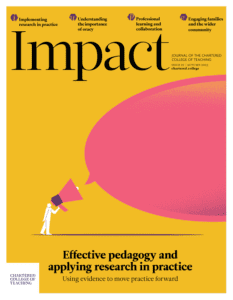From the editor
Written by: Becky Francis

5 min read
Professor Becky Francis, Chief Executive, Education Endowment Foundation, UK
There’s no doubt that schools today are in a much better position to judge what is most likely to work in their classrooms than they were 10 years ago. We have access to more robust evidence than ever, which gives us valuable information about which pedagogical approaches have been shown to be effective in the past, and, just as importantly, which have not. As the evidence base has grown, so too have teachers’ appetites for it (The Sutton Trust, 2022).
But generating evidence can only get us so far. An educational idea or intervention might have worked well under lab conditions and might be based on strong evidence and a robust theory of change; but what really matters for pupil outcomes is how it manifests itself in the day-to-day reality of the classroom. In fact, one of the key characteristics that distinguishes effective and less-effective pedagogical approaches is how they’re implemented (Sharpl
Join us or sign in now to view the rest of this page
You're viewing this site as a guest, which only allows you to view a limited amount of content.
To view this page and get access to all our resources, join the Chartered College of Teaching (it's free for trainee teachers and half price for ECTs) or log in if you're already a member.
- Education Endowment Foundation (EEF) (2021a) Effective Professional Development. Available at: https://educationendowmentfoundation.org.uk/education-evidence/guidance-reports/effective-professional-development (accessed 17 August 2023).
- Education Endowment Foundation (EEF) (2021b) Parental engagement. Teaching and Learning Toolkit. Available at: https://educationendowmentfoundation.org.uk/education-evidence/teaching-learning-toolkit/parental-engagement (accessed 17 August 2023).
- Education Endowment Foundation (EEF) (2021c) Small group tuition. Teaching and Learning Toolkit. Available at: https://educationendowmentfoundation.org.uk/education-evidence/teaching-learning-toolkit/small-group-tuition (accessed 17 August 2023).
- Education Policy Institute (2020) Evidence review: The effects of high-quality professional development on teachers and students. Available at: https://epi.org.uk/publications-and-research/effects-high-quality-professional-development/#:~:text=Evidence%20suggests%20that%20quality%20CPD,or%20lengthening%20the%20school%20day (accessed 17 August 2023).
- Sharples J, Albers B, Fraser S et al. (2019) Putting Evidence to Work – A School’s Guide to Implementation. Available at: https://educationendowmentfoundation.org.uk/education-evidence/guidance-reports/implementation (accessed 17 August 2023).
- The Sutton Trust (2022) School Funding and Pupil Premium 2022. Available at: https://www.suttontrust.com/our-research/school-funding-and-pupil-premium-2022/ (accessed 17 August 2023).
0
0
votes
Please Rate this content
Subscribe
Please login to comment
0 Comments
Oldest
Newest
Most Voted
Inline Feedbacks
View all comments










